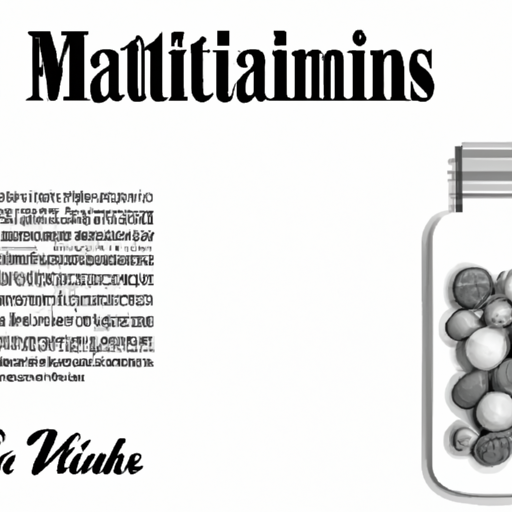What role do vitamins and minerals play in maintaining overall health? Vitamins and minerals are essential nutrients that your body needs in order to function properly and stay healthy. They play a crucial role in maintaining overall health by supporting various bodily functions and processes.
Vitamins, such as vitamin C, vitamin D, and vitamin E, are important for immune system function, skin health, and cell growth. They act as antioxidants, protecting your cells from damage caused by free radicals. On the other hand, minerals like calcium, magnesium, and potassium are necessary for strong bones, proper muscle function, and balanced fluid levels in the body. They also help in maintaining a healthy heart rhythm and optimizing nerve function. By including a variety of vitamins and minerals in your diet, you can ensure that your body receives the necessary nutrients it needs to function optimally and maintain overall health.

The Importance of Vitamins and Minerals in Maintaining Overall Health
Maintaining overall health is vital for leading a happy and fulfilling life. One crucial aspect of achieving optimum health is ensuring an adequate intake of vitamins and minerals. These essential nutrients play a significant role in various bodily functions and are essential for the proper functioning of our organs, systems, and overall well-being.
What are Vitamins and Minerals?
Vitamins and minerals are organic and inorganic substances, respectively, that are necessary for the normal growth, development, and maintenance of our bodies. While our bodies require these nutrients in small quantities, their absence or deficiency can have a profound impact on our health. Vitamins and minerals are found in different foods and can also be obtained through dietary supplements.
The Essential Role of Vitamins and Minerals in the Body
Vitamins and minerals are involved in a wide range of physiological processes in our bodies. They function as co-factors and catalysts for many biochemical reactions, ensuring the proper functioning of our cells, tissues, and organs. These nutrients are essential for the production of enzymes, hormones, and other vital substances in our bodies.
Vitamins: Key Players in Optimal Health
Different Types of Vitamins
Vitamins are classified into two categories: fat-soluble vitamins (A, D, E, and K) and water-soluble vitamins (B-vitamins and vitamin C). Fat-soluble vitamins are stored in the body’s fatty tissues and liver, while water-soluble vitamins are not stored and are eliminated through urine, requiring regular intake.
Functions and Benefits of Vitamins
Each vitamin has specific functions and benefits. Vitamin A, for example, is essential for maintaining healthy vision and promoting the growth and development of cells and tissues. Vitamin D is crucial for calcium absorption and bone health. Vitamin E acts as an antioxidant, protecting cells from damage caused by free radicals. B-vitamins are involved in energy metabolism, while vitamin C aids in collagen synthesis and strengthens the immune system.
Food Sources of Essential Vitamins
A balanced diet that includes a variety of foods is the best way to obtain the necessary vitamins. Vitamin A can be found in liver, carrots, spinach, and sweet potatoes. Sources of vitamin D include fatty fish, fortified dairy products, and sunlight exposure. Vitamin E can be obtained from nuts, seeds, and vegetable oils. B-vitamins are found in whole grains, meat, dairy products, and leafy green vegetables. Good sources of vitamin C include citrus fruits, strawberries, and bell peppers.
Minerals: Building Blocks for a Healthy Body
Overview of Essential Minerals
Minerals are classified into two categories: major minerals (calcium, potassium, phosphorus, magnesium, sodium, and chloride) and trace minerals (iron, zinc, copper, manganese, iodine, selenium, and molybdenum). While major minerals are required in larger amounts, trace minerals are needed in smaller quantities.
Roles and Functions of Minerals
Minerals play essential roles in various bodily functions. Calcium, for instance, is essential for strong bones and teeth, nerve function, and muscle contraction. Potassium is crucial for maintaining proper electrolyte balance and regulating blood pressure. Iron is necessary for transporting oxygen throughout the body, while zinc supports immune function and wound healing.
Dietary Sources of Important Minerals
A well-balanced diet that includes a variety of foods can provide the necessary minerals. Dairy products, leafy green vegetables, and fortified foods are excellent sources of calcium. Potassium can be found in bananas, potatoes, and legumes. Iron is abundant in red meat, poultry, and leafy green vegetables. Whole grains, nuts, and seeds are good sources of magnesium.
Vitamins and Minerals: Synergistic Effects on Health
The Interplay Between Vitamins and Minerals
Vitamins and minerals work together synergistically in our bodies. They often depend on each other for proper absorption, transport, and utilization. For example, vitamin D enhances calcium absorption, ensuring its proper utilization in bone health. Vitamin C promotes the absorption of iron from plant-based sources, preventing iron-deficiency anemia.
How Vitamins and Minerals Support Each Other
Vitamin E and selenium, for instance, work together as antioxidants, protecting each other from oxidative damage. Vitamin C regenerates vitamin E, ensuring a continuous antioxidant defense system. B-vitamins are essential for the metabolism of carbohydrates, fats, and proteins, supporting the utilization of minerals for energy production.

Deficiencies: The Consequences of Inadequate Vitamin and Mineral Intake
Common Deficiencies and Their Symptoms
Inadequate consumption of vitamins and minerals can lead to deficiencies, causing a range of health issues. For instance, vitamin D deficiency can lead to weakened bones (osteoporosis) and an increased risk of fractures. Iron deficiency can cause fatigue, weakness, and impaired cognitive function. Vitamin C deficiency can result in scurvy, characterized by fatigue, bleeding gums, and weak connective tissues.
Long-Term Health Effects of Vitamin and Mineral Deficiencies
Prolonged deficiencies of certain vitamins and minerals can have severe long-term health effects. For example, chronic iron deficiency can lead to iron-deficiency anemia, resulting in reduced cognitive function, decreased immune function, and impaired growth and development in children. Vitamin A deficiency can cause night blindness and increase the risk of infections and poor wound healing.
The Link Between Vitamins, Minerals, and Disease Prevention
Vitamins and Minerals as Antioxidants
Many vitamins and minerals act as antioxidants, protecting our cells from oxidative damage caused by free radicals. Vitamin C, vitamin E, and selenium neutralize free radicals, preventing cell damage and reducing the risk of chronic diseases such as heart disease, cancer, and age-related macular degeneration.
Prevention of Nutrient-Deficiency Disorders
Adequate intake of vitamins and minerals is crucial for preventing nutrient-deficiency disorders. For example, sufficient calcium and vitamin D intake can prevent the development of osteoporosis. Folic acid supplementation during pregnancy can reduce the risk of neural tube defects in newborns. Iron supplementation can prevent iron-deficiency anemia.

Optimal Intake: Understanding Recommended Daily Allowances
The Role of RDAs in Meeting Nutritional Needs
Recommended Daily Allowances (RDAs) are guidelines that indicate the average daily intake of vitamins and minerals necessary to meet the nutritional needs of most healthy individuals. These guidelines aim to prevent deficiencies while promoting optimal health. RDAs vary depending on age, sex, pregnancy, and lactation to accommodate different physiological requirements.
Factors Affecting Individual Nutrient Requirements
Several factors influence individual nutrient requirements, including age, sex, life stage, activity levels, health conditions, and medication use. Pregnant and lactating women require higher amounts of certain vitamins and minerals to support fetal development and breastfeeding. Athletes and individuals with specific health conditions may have increased nutrient needs.
Safety and Risks: Balancing Too Little or Too Much
Potential Risks of Excessive Vitamin and Mineral Consumption
While vitamins and minerals are essential for health, excessive intake can lead to adverse effects. Fat-soluble vitamins, such as vitamin A and vitamin D, can accumulate in the body and cause toxicity when consumed in excess. High intake of iron can lead to iron overload and damage organs. It is important to adhere to the recommended intake levels and avoid excessive supplementation.
The Importance of Moderation
Maintaining a balanced approach to vitamin and mineral intake is crucial. Consuming a diverse range of whole foods that provide an array of vitamins and minerals is the best way to obtain these nutrients. While supplements can be beneficial in certain situations, they should be used under the guidance of a healthcare professional to avoid unnecessary risks.

Supplements: Enhancing Nutrition or Unnecessary Additions?
The Pros and Cons of Vitamin and Mineral Supplements
Vitamin and mineral supplements can be useful in addressing specific nutrient deficiencies, especially when dietary intake is inadequate. They can offer a convenient way to ensure adequate nutrient intake. However, supplements are not meant to replace a healthy diet and should not be used as a substitute for a balanced eating plan. It is important to evaluate individual needs, consult with a healthcare professional, and choose high-quality supplements.
Making Informed Decisions About Supplement Use
When considering supplement use, it is crucial to make informed decisions. Assessing your individual nutritional needs, evaluating your current diet, and consulting with a healthcare professional can help determine whether supplementation is necessary. It is also essential to choose reputable brands that undergo rigorous testing and adhere to quality standards.
Conclusion
Vitamins and minerals are integral components in maintaining overall health and well-being. They play essential roles in numerous bodily functions and are involved in preventing deficiencies and protecting against chronic diseases. Obtaining these nutrients through a varied and balanced diet should be the primary approach, with supplements used when necessary and under professional guidance. Remember, achieving optimal health requires a holistic approach, and incorporating vitamins and minerals into your daily life is a vital step towards maintaining a healthy and vibrant you.

